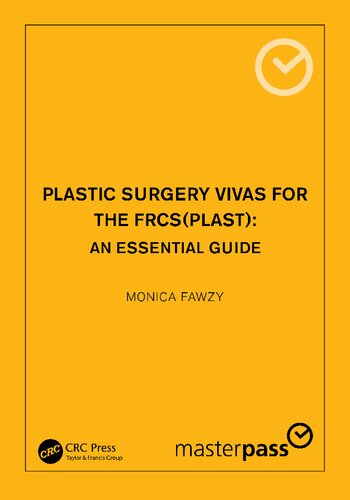

Most ebook files are in PDF format, so you can easily read them using various software such as Foxit Reader or directly on the Google Chrome browser.
Some ebook files are released by publishers in other formats such as .awz, .mobi, .epub, .fb2, etc. You may need to install specific software to read these formats on mobile/PC, such as Calibre.
Please read the tutorial at this link: https://ebookbell.com/faq
We offer FREE conversion to the popular formats you request; however, this may take some time. Therefore, right after payment, please email us, and we will try to provide the service as quickly as possible.
For some exceptional file formats or broken links (if any), please refrain from opening any disputes. Instead, email us first, and we will try to assist within a maximum of 6 hours.
EbookBell Team

0.0
0 reviewsThis is the first Q&A-based revision book specifically aimed at candidates sitting the viva component of the FRCS(Plast) examination. It provides a selection of common clinical scenarios presented in a realistic way and presents a guide to answering the FRCS (Plast) questions, as well as advice on how to approach the revision process itself. Crucially, this will help to prepare candidates to organise their thoughts, demonstrate higher order thinking and present a robust answer in the face of grey areas and controversies.
The text covers all topics from the syllabus including Trauma, Burns, Facial and Soft Tissue Injuries, Acute Head and Neck Tumours, Cleft and Craniofacial, Congenital anomalies, Facial Palsy, Vascular anomalies, Trunk & Perineal, Skin Cancer, Basic Sciences, Aesthetic, Ethics & Medico-legal, and Consent. Candidates using this book will be able to realistically recreate the exam scenario either in private or in a group setting.
This book is equally useful for candidates sitting plastic surgery post graduate exams with equivalent syllabuses to that of the FRCS(Plast) such as the EBOPRAS exam, as well as others. In addition, it also makes an excellent companion for trainees throughout the course of their six-year training rotation, allowing more junior plastic surgery trainees the opportunity to become acquainted with the format and content of the FRCS (Plast) exam. Lastly it may be helpful to consultants who are interested in coaching their trainees in topics other than their subspeciality.